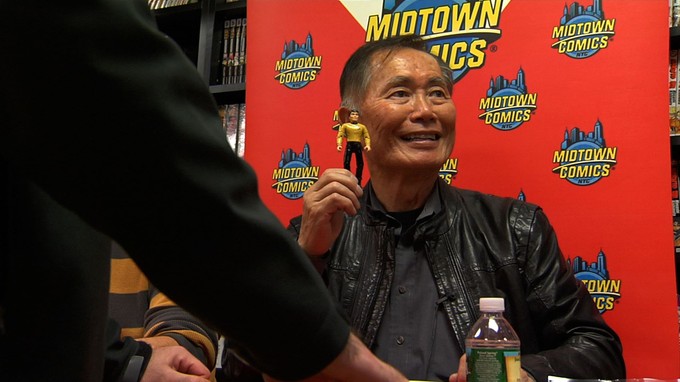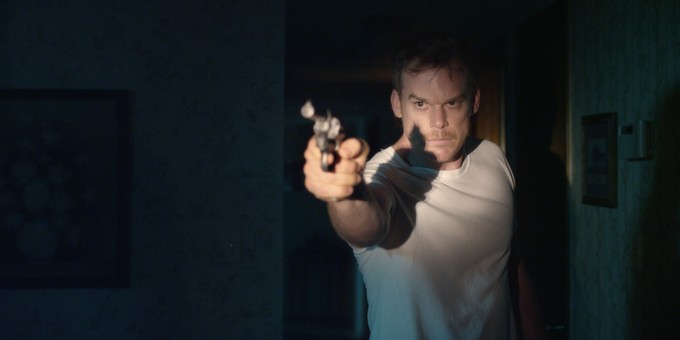
TO BE TAKEI
My parents came from a generation that didn’t have much tolerance for gay men and women. It may or may not have been intentional on their part, but they did their best to raise me to be a homophobe. They were both highly educated, and highly intelligent people. They were world travelers, students of history, frequented cultural centers all over the globe, and generally loving and generous. My father was even a straight ticket 80s Democrat, and my mother in her teens fought on the side of integration in a small Texas town in the 60s… yet they both taught me that “most gay people were turned that way by being molested as a child, and are most likely molesters themselves.” They also heavily subscribed to the “biblical abomination” theory, but would never go as far to say that any harm should come to gay people. They were just to be avoided in your personal life.
The topic came up a lot in my family because I always asked why we never saw my father’s brother. They explained to me that they didn’t trust him around us kids, because he was gay. My parents didn’t say these things with any kind of hateful stereotypical redneck malice, to them it was a scientific, or at least cultural, fact that homosexuals were not only “sexual deviants”, but most likely deviants in general, and not to be associated with. They were… not like us.
It wasn’t until college that I realized how much of this wrong headed thinking towards homosexuals they had managed to pass on to me on a subconscious level. I was a pretty cynical kid, so I never quite bought into their theories about gay men and women being molested/molesters, but I realized that I was severely shielded from any gay culture or images of loving gay couples my entire young life. It was to the point that well into my early 20s I still sort of internally cringed when I’d see two men kiss- but couldn't articulate why I had that reaction, or even why that was something I should work on. I had no ill will towards gay people at all, but I also didn't give much thought to their plight or my own inherited bigotries.
Of course, by the time I was in my mid 20s, I had thought about it and had made friends with enough people that were gay to realize that even having that internal “cringe” was a bigotry I needed to squash. It didn't match up to my conscious thoughts on equal rights (which I was in favor of), or even the way I felt about my friends that were gay. It was a tumor that had to be actively removed with reasonable thought, self awareness, logic, and compassion. The biggest part of that was seeing gay culture start to emerge in TV and movies, and start bringing the ideas of normalcy and commonality to gay orientation and gay couples (something I think a lot of anti-gay movement people are very afraid of… if it becomes normal, then their bigotry becomes the abnormal).
That’s what I loved most about TO BE TAKEI. It shows George and his husband Brad Takei in a very NORMAL marriage. They don’t try to sugar coat it or show the perfect version of their marriage. It has love, passion, but also little spats and disagreements that can get quite messy emotionally. It’s not “gay” marriage, it’s just marriage. That picture of commonness is very important for people that were raised to be homophobes, like me, to be exposed to. It opens up the mind and makes you actively question the premise of why these fellow humans were meant to be shunned or restricted in the first place.
The movie is also as funny and charming as Mr Takei’s Facebook feed. For anyone that follows him there, you know how entertaining his daily muses can be. In this movie we get a behind the scenes look at where that insight and humor springs from. George Takei has faced hardships beyond most of our comprehension, from having to endure Japanese-American internment camps as an adolescent after the bombing of Pearl Harbor, to fighting Asian stereotypes in Hollywood roles, to having to hide his sexual orientation for the majority of his working career, and, of course, working with William Shatner (who comes off as the biggest jerk in the world in his interviews for the movie… still, I love Captain Kirk.) He faced all of these challenges with humor and the personal motto of rejecting negativity in his life. It’s all very uplifting and inspiring.
I do have to wonder what would have happened if Takei had decided to come out a little earlier in his career. I was a huge Trek fan as a child in the 80s, and to have one of the crew of the Enterprise come out as gay might have made me question my parents a little more. Perhaps even been an earlier advocate in my life for equal rights for homosexuals. Still, I can’t blame him for that. He even questions his own timing and if he should have done it earlier, but realizes that if he had, he wouldn't have been in the public light as much now to be such a strong advocate when history was ready to shift to the side of the righteous on this issue.
I highly recommend seeking this documentary out for anyone that is a Takei fan, a Trek fan, and for people that still need a dose of seeing a loving gay couple as normal and deserving of the same respect and rights we all should be able to enjoy.

COLD IN JULY
The biggest compliment I can give this movie is to tell you to stop reading my review for it right now. It’s a very twisty path this movie takes, and going in as blank as possible is the right way to go.
If you’re a ROLLING THUNDER fan, a lot of the beats of this movie will feel very familiar to you. It’s not an exact copy by any means, but the story maneuvers in the same ways, and the ending satisfies in very similar ways.
The movie starts off with Michael C Hall waking up to a noise in the middle of the night. His wife is spooked, so he clumsily loads an old revolver he has next to his bed, slowly inspects the hallways and rooms of his out-in-the-boonies Texas home, then flinches when he sees a dark figure illuminated in his living room. The flinch results in him discharging his weapon, and discharging the shadowy figure’s brains onto the wall behind him. The story that evolves beyond that point is fascinating and not expected at all, even for someone like me that usually sees twists and turns coming from a mile away and dreads them.
I’ve been a Michael C Hall fan since the days of Six Feet Under. He has an amazing range, but I don’t know that we’ve ever seen him take a dramatic and exciting arc like we see in COLD IN JULY. I could never pin what his character's next move was ever going to be, so he was able to maintain a sense of suspense all though the movie almost with his performance alone. There’s another great actor that emerges about half way into the story, and his character is a lot of fun. I honestly don’t want to ruin who it is because him showing up is such a great entrance. Although Quint just made a good point that he’ll be all over the trailer for the movie when it comes out, so I’ll just say it’s Don Johnson… very much Don Johnson… and Don Johnson rocks rad sauce in this movie. It turns into a bit of a men on a mission movie, and the chemistry is a joy to watch between all involved.
The movie is a period piece- it takes place in an 80s version of small town Texas- and might be the cause of one of the only drawbacks to the movie aesthetically: the score. It feels like they’re trying to do the John Carpenter score version of DRIVE and the music at times feels very out of place with the tone of the rest of the movie. It’s a nice attempt, and the synth score works in a few places quite well, but it’s too inconsistent and makes some of the earlier scenes almost comical, when they shouldn’t have been.
The cinematography is beautiful in this movie. With enough inky blacks, midnight blues, and soft amber to make Fincher and Nolan both swoon. It sets the mood of the movie perfectly, and slowly pushes the movie toward a very southern fantasy feel. It’s knock out visual work that makes the movie worth seeking out just on that merit.
It’s a movie that you need to take the ride with and trust the storyteller, but by the end of the journey I think you’ll like where it ends up.
-Kraken
@aaron_morgan
